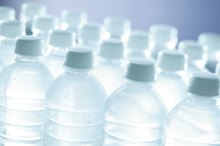What does fact checked mean?
At Healthfully, we strive to deliver objective content that is accurate and up-to-date. Our team periodically reviews articles in order to ensure content quality. The sources cited below consist of evidence from peer-reviewed journals, prominent medical organizations, academic associations, and government data.
The information contained on this site is for informational purposes only, and should not be used as a substitute for the advice of a professional health care provider. Please check with the appropriate physician regarding health questions and concerns. Although we strive to deliver accurate and up-to-date information, no guarantee to that effect is made.
What Ingredients Are in Pedialyte?
Pedialyte, a brand-name fluid and mineral replacement therapy, is used to treat dehydration and nutrient loss from diarrhea and vomiting in children. If you're an athlete, Pedialyte can help quickly replace minerals and water lost during exercise, competition and extreme heat. The ingredients help promote rapid fluid and mineral absorption in the small intestine. Other types of drinks can be too high in sugar and too low in minerals to replenish vital nutrients.
Sodium/Chloride
Sodium and chloride, the primary minerals located outside your red blood cells, are lost with bouts of diarrhea and vomiting in children and strenuous exercise in adults. Both are important to nerve, muscle and heart function. Sodium, absorbed in the small intestine, aids chloride, carbohydrate and water absorption. Chloride, an important component of hydrochloric acid in your stomach, helps digestion and absorption of nutrients, according to the Linus Pauling Institute.
- Sodium and chloride, the primary minerals located outside your red blood cells, are lost with bouts of diarrhea and vomiting in children and strenuous exercise in adults.
- Chloride, an important component of hydrochloric acid in your stomach, helps digestion and absorption of nutrients, according to the Linus Pauling Institute.
Potassium
Ingredients in Pediasure
Learn More
Potassium, the primary mineral inside your red blood cells, is necessary for nerve, heart and muscle cell action. Potassium helps control your heart rate, protein synthesis and energy production by converting blood sugar into glycogen, according to the Massachusetts Institute of Technology. Low potassium, or hypokalemia, from diarrhea and vomiting can cause an irregular heart rate, muscle weakness and spasms.
- Potassium, the primary mineral inside your red blood cells, is necessary for nerve, heart and muscle cell action.
- Potassium helps control your heart rate, protein synthesis and energy production by converting blood sugar into glycogen, according to the Massachusetts Institute of Technology.
Zinc
Zinc, a trace mineral that protects your immune system, aids energy production vital to growth and development. Zinc has a role in tissue healing as well as your hormone and enzyme function. A zinc deficiency, caused by vomiting and prolonged diarrhea, contributes to malnutrition and increases susceptibility to infections. Supplementing zinc losses with Pedialyte can decrease the frequency, severity and the duration of diarrheal episodes in children.
- Zinc, a trace mineral that protects your immune system, aids energy production vital to growth and development.
- Supplementing zinc losses with Pedialyte can decrease the frequency, severity and the duration of diarrheal episodes in children.
Carbohydrates
What Are the Benefits of Rice Water for Babies?
Learn More
Pedialyte uses small amounts of dextrose and fructose, instead of sucrose, as the primary carbohydrate ingredient. Dextrose is easily digested, improves the taste for children and increases the absorption of water and sodium. Sucrose, or table sugar, can worsen diarrhea in children by pulling water into the intestine, increasing the volume of diarrhea and the loss of nutrients. Pedialyte is available in liquid, powder and freezer pop forms, and in a variety of flavors.
- Pedialyte uses small amounts of dextrose and fructose, instead of sucrose, as the primary carbohydrate ingredient.
- Sucrose, or table sugar, can worsen diarrhea in children by pulling water into the intestine, increasing the volume of diarrhea and the loss of nutrients.
Water
Water is also lost with bouts of diarrhea and vomiting in children and exercise with athletes. Water is used in Pedialyte to fill volume in the solution but does not replace minerals lost 2. The amount of Pedialyte used is based on the weight of the child or adult. Pedialyte is low in calories and is not used exclusively for extended periods of time. It is appropriate for use in a prescribed clear liquid diet.
- Water is also lost with bouts of diarrhea and vomiting in children and exercise with athletes.
- Water is used in Pedialyte to fill volume in the solution but does not replace minerals lost 2.
Related Articles
References
Writer Bio
Helen Messina started writing in 2010. She is a registered nurse with experience in rehabilitation, long-term/subacute care, pediatric/adult home care and has worked in acute care facilities in Florida, Pennsylvania, New Jersey and New York. Messina's specialties include neurology, cardiac and renal care. She holds an associate degree in nursing from Gannon University.









